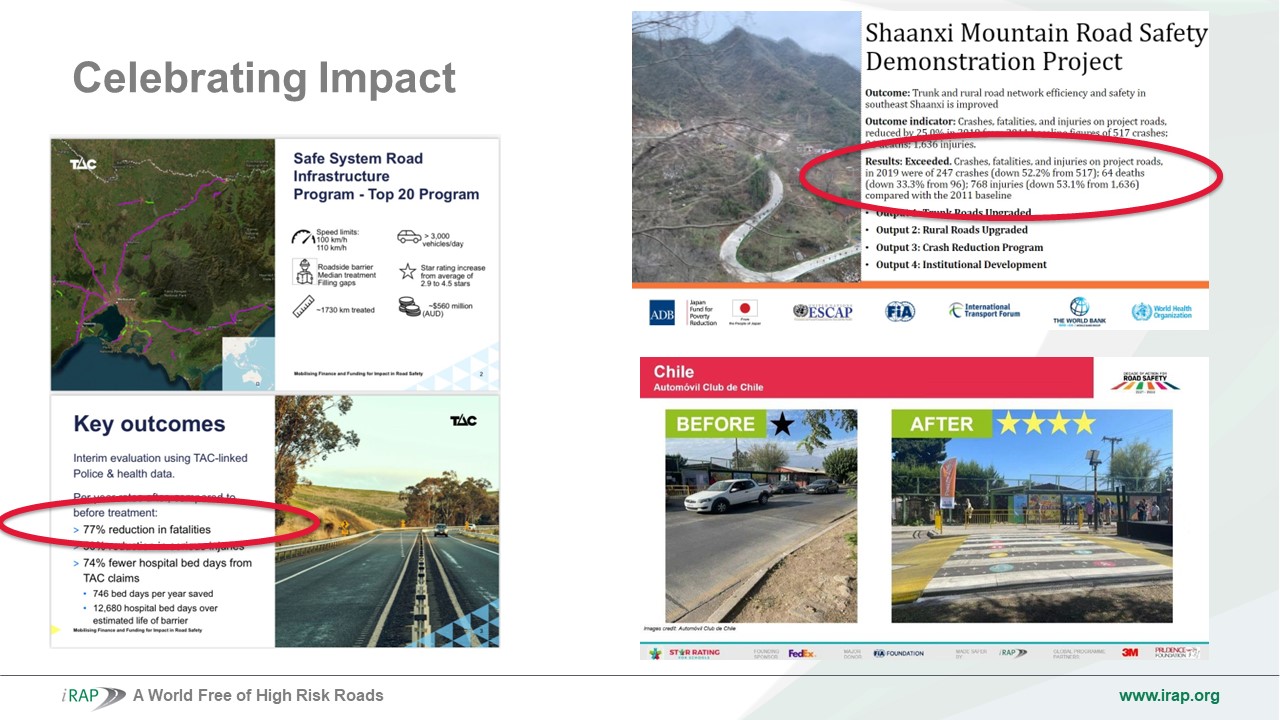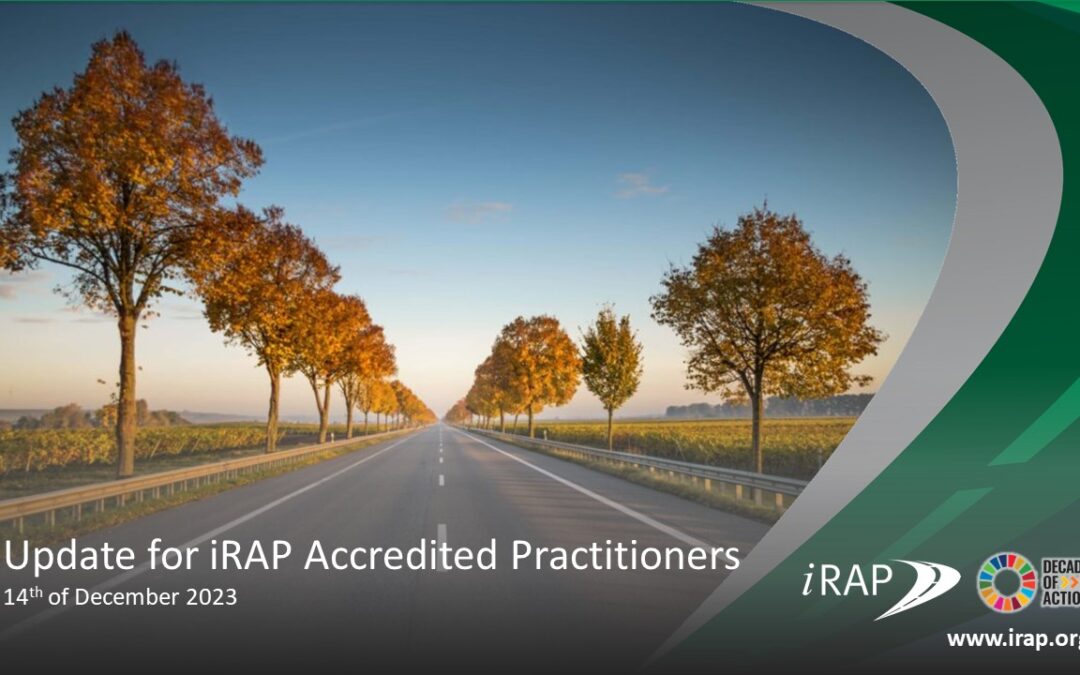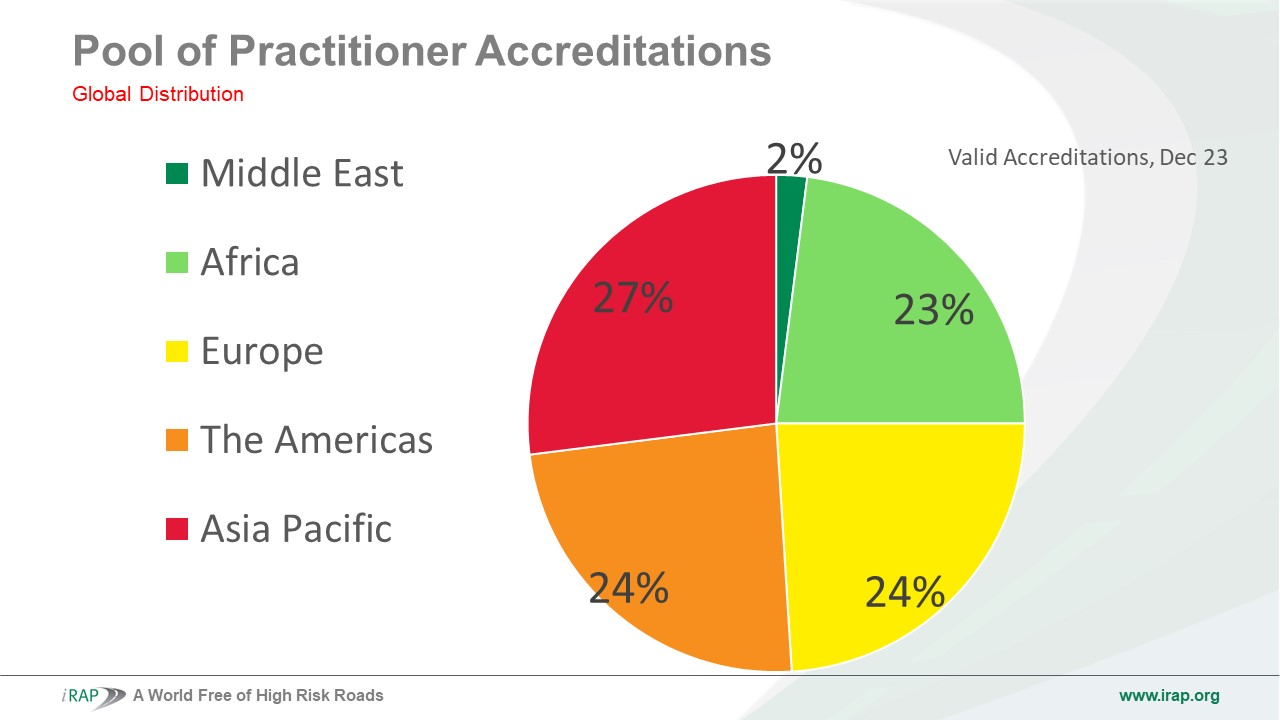Forty iRAP accredited practitioners from across the world gathered online last week to celebrate the success of their iRAP projects and hear the latest on program developments, tender opportunities, and professional development for this specialist community of technical experts.
There are currently 227 iRAP Accredited individuals and 15 inspection systems in 46 countries, highly skilled in the iRAP Methodology and ready to support iRAP surveys, coding, analysis and reporting, and Star Rating for Schools quality assurance.
In a review of DevelopmentAid.org, just one online resource for individuals and organisations seeking to become successful in international development, there are currently 50 development bank and donor-led road safety projects with an iRAP component for safer roads.
The iRAP Accreditation program aims to provide and link globally verified practitioners with project funders to ensure implementation of projects anywhere in the world is to the same consistent global standard to support the achievement of UN Targets 3 and 4.
The iRAP Training Program also works with organisations to build their own local capacity to run projects.
The below chart shows the breadth of regional capacity served by our pool of iRAP Accredited Practitioners
Last week’s Workshop celebrated best practice case studies of practitioner projects in nearly 20 countries, and program developments to support the network including updates to ViDA and the Star Rating Essentials Course informed by Practitioner feedback.
ViDA updates have improved:
- Data processing speed by 3 to 6 times
- Ability to move datasets by region and project more powerfully for better locational accuracy
- Inclusion of GPS end points in ViDA upload files for improved mapping
- The ability to update datasets from the Reports page for greater freedom and speed in managing data
- A new file structure in ViDA Demonstrator to enhance the filing of road sections for improved data management
- The Star Rating for Designs RAP App BETA Version 2, currently being piloted, is a GIS-based tool which offers speed and flexibility. It enables you to upload CAD files, overlay them on a satellite image, and draw your road and coding on top. The improved app now makes it easier to map and code road designs to ensure safety is ‘built in’ to the design right from the start.
- Once you finish a Star Rating project and Safer Roads Investment Plan (SRIP), additional massaging of the scope can sometimes be required to fit the exact project scenario. The Route Review Tool enables you to define the Investment Plan yourself and reprocess the data quickly to obtain a new Star Rating and SRIP.
Accredited Practitioners are encouraged to try the new features and tools within ViDA, and updated Star Rating Essentials short course. Feedback is always welcome.
During the workshop, nine accredited practitioners shared insights, challenges and opportunities from their iRAP projects around the world. Presentations included:
- Stelios Efstathiadis, Transportation Solutions – Attribute coding and client requirements for particular country characteristics
- Ramadhani Msangi, RSA Tanzania – Investigating the relationship between speed and traffic flow in Tanzania
- Mark Figuls, Factual Consulting – Experience of the 1,500km interurban road network project in Oman, Factual’s iRAP innovation partnerships, and the CycleRAP Lane Patrol Tool.
- Antonino Tripodi and Edoardo Mazzia, FRED Engineering – Use of iRAP tools in projects in Italy, Mozambique and Tanzania to conduct baseline Star Ratings, Star Rating for Designs, FSI estimations, countermeasure and economic impact analysis, and to support advocacy.
- Leonid Ljubotina, Faculty of Transport and Traffic Sciences, University of Zagreb (FPZ) –iRAP road safety assessments in Ethiopia, Kenya and for the Croatian Automobile Club, a CycleRAP pilot project in Fayetteville (USA), and the European Commission’s Connecting Europe Facility Project SLAIN in Croatia, Greece, Italy and Spain. FPZ’s iRAP consultancies have been performed both in-country and remotely.
- Harani Patel, CoAct Solutions – Learning from iRAP Coding in the Karnataka State Highways Improvement Project (KSHIP), India.
- Kunawee Kanitpong, Thailand Accident Research Centre – iRAP Star Ratings on 275km of NR13S in PDR Lao. Post construction assessments will be conducted in mid-2024.
- Moustafa Zain, Jacobs – Use of road safety audit and iRAP Star Ratings in Qatar.
- Sandeep Kumar, Asian Institute of Transport Development (AITD) – Lessons from iRAP assessments in seven states of India.
Many interesting topics were raised, often about speeds:
- How do Star Ratings for a road change between night and daytime as travel speeds change?
- How do poor pavements impact travel speeds (and how do new, smooth pavements impact speeds)?
- What is the relationship between driving culture and infrastructure design?
- What is the impact of increasing speed limits? Does it improve congestion?
(Quick tip: other things being equal, speeds up = stars down = safety down)

iRAP brings its Accredited Practitioners together multiple times per year. The Workshops are an important component of capacity building for the network and provide a forum for practitioners to share and collaborate on project experiences, challenges and solutions.
We look forward to seeing what our iRAP Accredited champions for safety achieve in 2024!



















